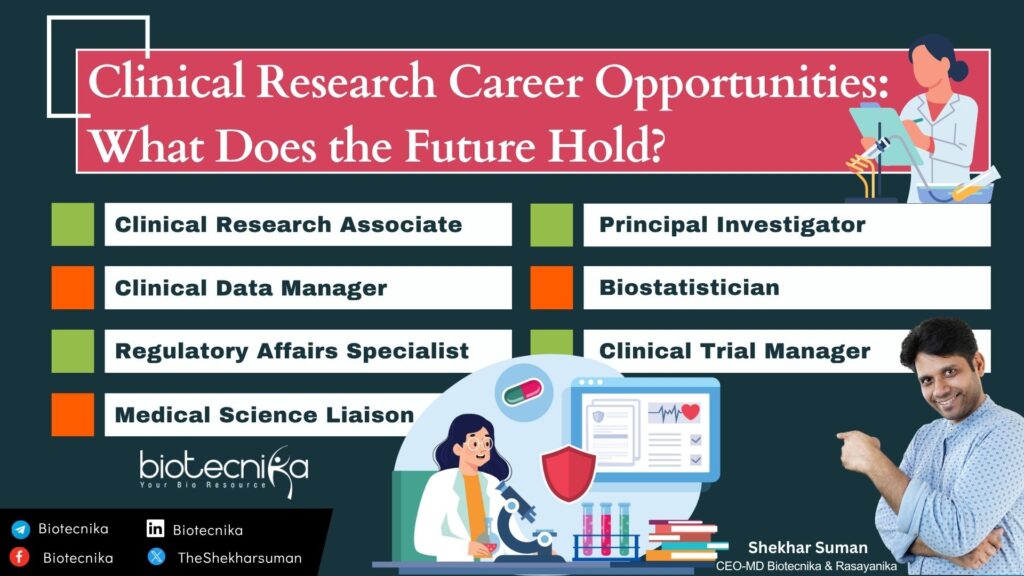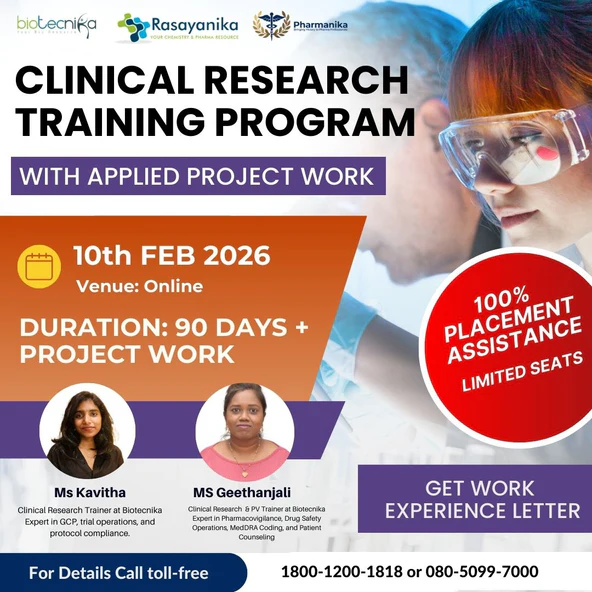Table of Contents
Clinical Research Career Growth: What Does the Future Hold?
Welcome to the year 2040. Here, clinical trials have entered a new era by introducing personalized health pods in patients’ homes. These advanced health pods enabled patients and volunteers to perform self-assessments. Then, they receive precise and customized medications, as well as share real-time feedback through futuristic tools and technologies. Patient advocates ensure that every patient or volunteer feels safe, engaged, and supported. This would be the groundbreaking approach that will redefine clinical research in the future. With trust and enhanced inclusivity, as well as streamlining processes, these futuristic innovations would set a new standard for patient-centered healthcare as well as efficiency.
Clinical research provides the foundation for innovative and advanced treatments, enhanced therapies, as well as a deeper understanding of diseases and disorders. As healthcare advancements evolve worldwide, so do the opportunities as well as challenges within clinical research. This article explores the growth trajectory of Clinical Research careers and the skills in demand. It also examines their trends, as well as potential career pathways for budding Researchers like you!
The Expanding Scope of Clinical Research
Over the last few decades, Clinical Research has grown and expanded trials. It now encompasses diverse areas such as Medical Devices, digital health, Biologics, and Personalized Medicine. The global clinical trials market is estimated at USD 84.61 billion in 2024. It is estimated to reach from USD 91.50 billion in 2025 to USD 146.60 billion by 2033. This growth reflects a CAGR of 6.07% during 2025–2033, showcasing the thrilling journey of increasing investments in R&D (Research and Development).
Key drivers of the growth include:
- Technological Advancements: Artificial Intelligence (AI), Big Data Analytics, Machine Learning (ML), and wearable devices transform how trials are designed and conducted. For instance, AI algorithms can analyze large datasets to identify potential drug candidates, wearable devices can monitor patient health in real-time, and big data analytics can predict patient recruitment rates. Advances in Clinical Research will lead to efficient and rapid trials, real-time monitoring, as well as improved data accuracy.
- Globalization of Trials: Multinational clinical trials are becoming the norm, offering professionals opportunities to work on diverse projects across geographies.
- Regulatory Evolution: Regulatory authorities harmonize as well as adapt to emerging technologies. Clinical Research professionals with a good knowledge of international regulatory guidelines, such as ICH-GCP (International Council for Harmonisation Good Clinical Practice), FDA (Food and Drug Administration), and EMA (European Medicines Agency) regulations, are in high demand.
- Funding resources: Various governments as well as private authorities, provide significant funding to clinical research professionals, especially those working in fields such as Oncology, infectious diseases, and rare diseases and disorders, through angel investors, venture capitalists, NGO funds, etc.
Career Opportunities in Clinical Research Career Growth
The Clinical Research industry has a variety of career roles that cater to multiple skill sets as well as career aspirations. Let’s explore some of the prominent career opportunities and the skills required for each role:
- Clinical Research Associate (CRA):
- Role: They monitor clinical trials, ensure protocol compliance, as well as maintain data integrity.
- Skills Required: Professionals should have a strong understanding of ICH-GCP guidelines, attention to detail, as well as have excellent communication skills.
- Growth Path: With experience, CRAs can advance to senior CRA roles, clinical trial managers, or even project leaders.
- Clinical Data Manager (CDM):
- Role: They handle data collection, cleaning, as well as validation to ensure the accuracy and reliability of the datasets.
- Skills Required: CDM should have proficiency in clinical data management systems (e.g., Medidata, Oracle Clinical) as well as good experience with analytical tools.
- Growth Path: Senior data management roles, database architects, or transition to Biostatistics.
- Regulatory Affairs Specialist:
- Role: They ensure compliance with local and international regulatory guidelines and requirements throughout the Clinical Trial process.
- Skills Required: Professionals should have a good knowledge of regulatory guidelines (FDA, EMA), strong organizational skills, as well as attention to detail.
- Growth Path: Senior regulatory positions, regulatory strategists, and policy advisors.
- Medical Science Liaison (MSL):
-
- Role: They serve as a bridge between clinical research teams as well as healthcare professionals and communicate scientific insights.
- Skills Required: In-depth scientific knowledge, excellent interpersonal skills, as well as presentation abilities are required.
- Growth Path: Senior MSL roles, scientific directors, or clinical education specialists
-
- Principal Investigator (PI):
-
-
- Role: They supervise the design, execution, as well as integrity of clinical trials.
- Skills Required: PIs should come from a strong academic and research background, troubleshooting skill sets, as well as leadership capabilities.
- Growth Path: Research leadership positions, academic roles, or consultancy
-
-
- Biostatistician:
-
-
-
- Role: Design study protocols and analyze trial data to derive meaningful conclusions.
- Skills Required: Expertise in statistical tools (e.g., SAS, R), data modeling, and critical thinking.
- Growth Path: Senior statistician roles, data science leadership, or biostatistics consultancy.
-
-
-
- Clinical Trial Manager (CTM):
-
-
-
-
-
- Role: They are in charge of the trial planning execution, as well as team coordination to meet timelines and budgets of the clinical trials.
- Skills Required: They should have project management expertise, multitasking abilities, as well as leadership qualities.
- Growth Path: Director of clinical operations, program manager, or clinical portfolio manager.
-
-
-
-
The job opportunities are endless, and some additional career roles include Pharmacovigilance, Quality Assurance, as well as Patient Advocacy. These professionals contribute uniquely to the Clinical Research ecosystem.
Qualifications and Skills for Clinical Research Professionals
In the competitive and evolving field of Clinical Research, professionals should possess a mix of Scientific and technical expertise, transferable skills, as well as critical soft skills to thrive and shine.
- Academics: A degree in Life Sciences, Pharmaceuticals, Medicine, or related fields is a prerequisite. Advanced degrees such as a Master’s or Ph.D. can provide an extra edge.
- Technical Skills: Proficiency in Clinical Trial Management software (e.g., Oracle Clinical, Medidata), statistical tools (e.g., R, SAS), as well as electronic data capture systems is highly desirable.
- Regulatory Knowledge: Familiarity with guidelines such as ICH-GCP, FDA regulations, and EU Clinical Trial Regulations is essential.
- Soft Skills: Effective communication, attention to detail, problem-solving, as well as teamwork are important for success.
With rapid technological and Scientific advancements, continuous learning is a necessity in Clinical Research. Staying updated through certifications and courses such as those from SOCRA (The Society of Clinical Research Associates) and ACRP (Association of Clinical Research Professionals), as well as training programs, is a way to keep up. Staying committed to your professional development and the industry’s future is crucial. The dynamic nature of clinical research demands a proactive approach to continuous learning as well as adapting to new trends and technologies.
Emerging Trends Shaping Career Growth
- Decentralized Clinical Trials (DCTs): The COVID-19 pandemic accelerated the adoption of remote technologies and DCTs, which allow patients and volunteers to participate in clinical trials from their homes are gaining traction. Clinical Research Professionals skilled in managing virtual trials as well as leveraging telehealth tools are poised for success.
- Artificial Intelligence (AI) & Machine Learning (ML): AI revolutionizes Drug Discovery, patient stratification, as well as data analysis. Expertise in AI-driven platforms will be a valuable asset for clinical researchers.
- Personalized Medicine: As therapies become more customized to individual genetic profiles, clinical researchers adapt to new clinical trial designs as well as methodologies for further advancements.
- Sustainability in Trials: With growing awareness for Sustainability and eco-friendly practices, steps like reducing paper use as well as optimizing logistics are becoming priorities in clinical research trials.
- Focus on Patient-Centric Approaches: Ensuring patient engagement and addressing trial diversity are increasingly highlighted. Emerging career roles centered around patient advocacy as well as experience are trending, where professionals work to make clinical trials more inclusive and patient-friendly.
Eventhough Clinical Research offers career growth opportunities, it also presents some challenges as well. One should know what these challenges are and how to overcome them for a successful career in this field. These include:
- Regulatory Guidelines Complexity: Navigating varying regulatory guidelines across countries can be a time consuming as well as tedious task. Clinical Research professionals should invest their time in understanding global regulatory frameworks.
- High Pressure: Meeting tight deadlines while ensuring data accuracy requires resilience and time-management skills.
- Evolving Tools and Technologies: The rapid pace of technological and Scientific evolution necessitates continuous learning and upskilling.
Clinical Research professionals should take part in mentorship programs, industry conferences, as well as online courses. These opportunities help them overcome challenges, build their network, and enhance expertise.
Future Outlook for Clinical Research Career
The future of Clinical Research is quite bright, with robust demand for skilled Clinical Research professionals driven by:
- Increasing Disease Burden: The rise in infectious and chronic diseases underscores the need for ongoing Clinical Research.
- Global Collaborations: International partnerships are fostering innovation as well as expanding Clinical Research career opportunities.
- Integration of Digital Health: Digital tools and technology enhance Clinical Trial efficiency, creating new job roles in Data Science, IT, as well as wearable technology integration.
This translates to many opportunities for aspiring Clinical Research professionals. They can make a meaningful impact while advancing their careers.
Clinical research is at the forefront of transforming Healthcare and offers dynamic career opportunities for those ready to embrace innovations and their challenges. Clinical Research professionals can thrive in this growing field by continuously learning, staying adaptable and updated, as well as mastering Scientific, technical and soft skills. As the industry expands and diversifies, the question is not just about the future of clinical research careers but about how you can reshape that future for its betterment.
Want to Build a Career in Clinical Research?
Work on real 1, 3, or 6-month projects – recruiters notice hands-on experience!
Apply Now: https://btnk.org/clinical-research-training
Talk to an Expert: https://btnk.org/contact-CR-Expert
New Batch Starts: 10th Feb 2026



































